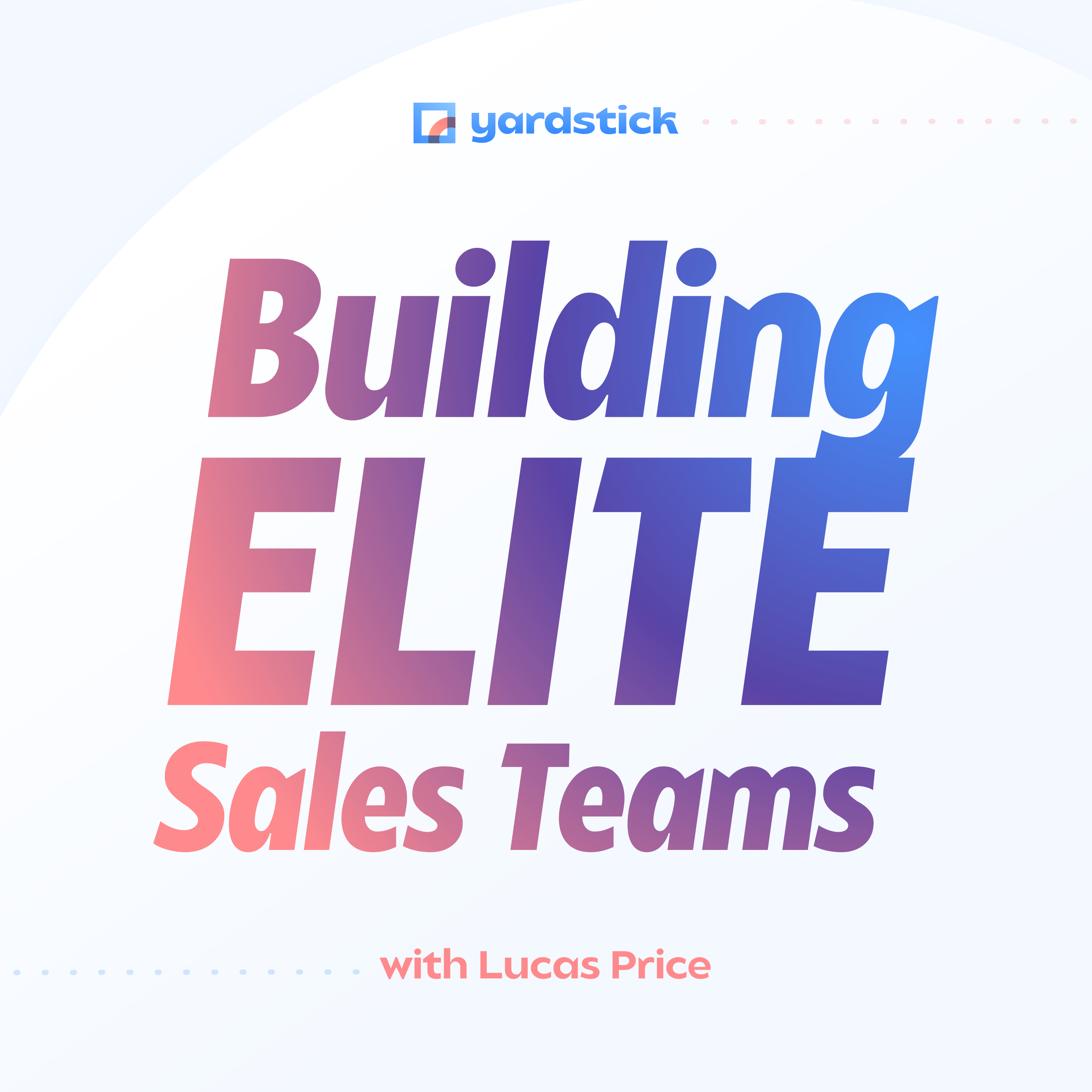Episode 57
BEST Snippet - The Anatomy of a Perfect Sales Hire: Scorecards and Beyond Featuring Kyle Norton
Summary
Lucas Price and Kyle Norton dive into the essentials of building elite sales teams. They discuss Kyle's proven framework for talent acquisition, onboarding, and continuous development. Learn about the significance of scorecards in maintaining hiring consistency, the importance of mindset, skills, and specific knowledge in selecting the right candidates, and how structured evaluation criteria can reduce cognitive bias in hiring. Gain actionable insights that can enhance your ability to build and sustain a high-performing sales team.
Take Aways
- Structured Hiring Process: Using a consistent, pre-determined set of criteria and scorecards for evaluating candidates helps eliminate cognitive biases and improve the quality of hires.
- Mindset Over Skillset: For early-stage and high-velocity environments, prioritizing mindset traits such as drive and curiosity is often more critical than specific sales experience.
- Comprehensive Scorecards: Breaking down evaluation into mindset, skills, and specific knowledge ensures comprehensive assessment suited to the company's needs and market.
- Continuous Development: Regular coaching and development of sales teams are crucial for keeping up with evolving market demands and achieving long-term success.
- Career Planning: Clear internal career mapping is essential to keep team members engaged and motivated for the long haul.
Learn More: https://www.yardstick.team/
Connect with Lucas Price: linkedin.com/in/lucasprice1
Full Episode: https://podcast.yardstick.team/episode/scorecarding-for-success-how-to-build-an-elite-sales-team
Subscribe to our YouTube Channel: https://youtube.com/playlist?list=PLR0BMWoMgPMcHJ4yLLSUhbuafMmdhJTSy&si=tzQz7NFvDdT8Kj8Q
Connect with Dr. Jim: linkedin.com/in/drjimk
Mentioned in this episode:
BEST Snippet Intro
BEST Snippet Outro
Transcript
Today on Building Elite Sales Teams, we have Kyle Norton with us. Kyle Norton is the SVP of sales at Owner. com. He has 15 years in revenue leadership, most recently at Shopify, where he ran sales and customer success for Canada. And before that, he was the VP of sales at league, taking it from zero to 200 to 25 million in ARR.
So on the building elite sales teams podcast, we often talk about talent and we're going to do that here again today. Can you tell us, what are some of the. Basics that you think need to be in place to, to build the talent portion of that pillar.
[:Can you secure those people? Can you get them to opt in? And so on the talent acquisition side, that's it's those four things. Thank And then once they have started at your company, then there's a couple of phases. There is the, there's phase one, how well can you onboard and get people to some sort of initial proficiency?
fficiency, and just like the [:And then on an ongoing basis, what are you doing to consistently coach and develop your team? How did they develop new skills? How quickly are they progressing? I think the velocity of improvement of at the individual level is the single biggest indicator, whether or not you're going to have sustainable success, because we know that markets change so much and the number only goes one way.
It only goes up. So just to keep pace with the natural inertia of a startup and quotas going up sort of 15, 20, 50 percent year over year, how fast are you getting your teams ready to carry that load? And, beyond Those would be the major facets of talent development. And then, the last piece would be your career planning.
ly critical and that career. [:[00:03:01] Lucas Price: Lots of great information there. Since we don't have time to talk about all of it, I'm going to try to, pick one thing and go down the rabbit hole on one of the things that you mentioned there. What's the reason that scorecards are important to you?
[:If your experiment is different every single time. If you have all sorts of variables changing, the order of the questions is different. The types of questions and what questions that you [00:04:00] ask the experience being, being different every time it's impossible to truly compare. In our, Hiron curriculum it's broken down in, the specific questions we want to ask in a first interview the information we give them between interview one and interview two, how the case study is written the order of the questions in the case study, the feedback we give them, like everything is predetermined in terms of a scripting perspective, but then they're all measured against a really specific court scorecard because Humans are bad at evaluating other humans.
I think Daniel Kahneman makes this argument in a very compelling manner and thinking fast and slow. And so being able to force yourself to evaluate each individual component of A candidate gives you way more clarity as to how this person has performed. And I think especially in sales, the biggest challenge here is charisma colors all.
And so by scorecarding, we get to separate like discrete elements scorecard,
[:The scorecarding makes you discreetly score each component which helps for better decision making.
[:It makes sense when my team gets bigger and there's multiple decision makers, but when I'm the decision maker, do I need a scorecard? What would you say to that person?
[:Have all of the cognitive biases affect us and lead us down the wrong path that having at least a bullet point scorecard that you're going off of written down. So you can reference it. It's just going to help you make better decisions I've personally sat down and done a scorecard for somebody that I really liked or didn't like as much.
And then being like, Oh, wow, yeah. I was probably going to go the wrong direction on this. And then you have one of those moments where you're reviewing a candidate and you're like, Oh, they were really great. They were so compelling, yada, yada, yada. And then it's they didn't really ask me like almost a single question and they were like pretty well prepared, but not that well, prepared.
They [:[00:07:16] Lucas Price: You mentioned some of the traits that are commonly looked for among salespeople that you put on a scorecard. Can you tell us how do you structure your scorecard as a whole?
[:The type of customer, the type of sale that you run. So there's a framework I like to use that I've evolved depending on the roles I'm hiring for, but it's, is the rough structure is pretty consistent. So the scorecard has three components. One is mindset. [00:08:00] Two is skills and then three is specific knowledge.
And so in my current world, I'm hiring, first one to five year sellers we're SMB oriented high velocity sale. So my top segments, I've got more experienced sellers, but for the most part, it's like quite transactional. And so in this environment, mindset is way more important than anything else.
Because if you've only got two years of selling experience and those happen to be in places that like don't have great sales pedigree, then you just won't know how to do it properly. But those bad habits they're not that deeply ingrained, but if you've got huge drive, you're super curious, you're a learning machine.
less than that for AE. Cause [:I want to see, call it, so if it's 60 percent mindset. We're 25 percent skillset and 15 percent specific knowledge. If you've worked in a restaurant, you're passionate about restaurants. The specific knowledge does matter for sure. I like it to be there, but I'm not optimizing for it. If I was hiring enterprise sellers and I was selling into.
Engineering and dev teams. Yeah, if you have no specific knowledge and you're trying to work half a million dollar enterprise dev ops tool you just don't have the credibility to walk into that room and think that you're going to learn fast enough to get deals done, so it has to flex depending on your environment, but under each of those categories, I've got a bunch of things.
en specific knowledge is, do [:


